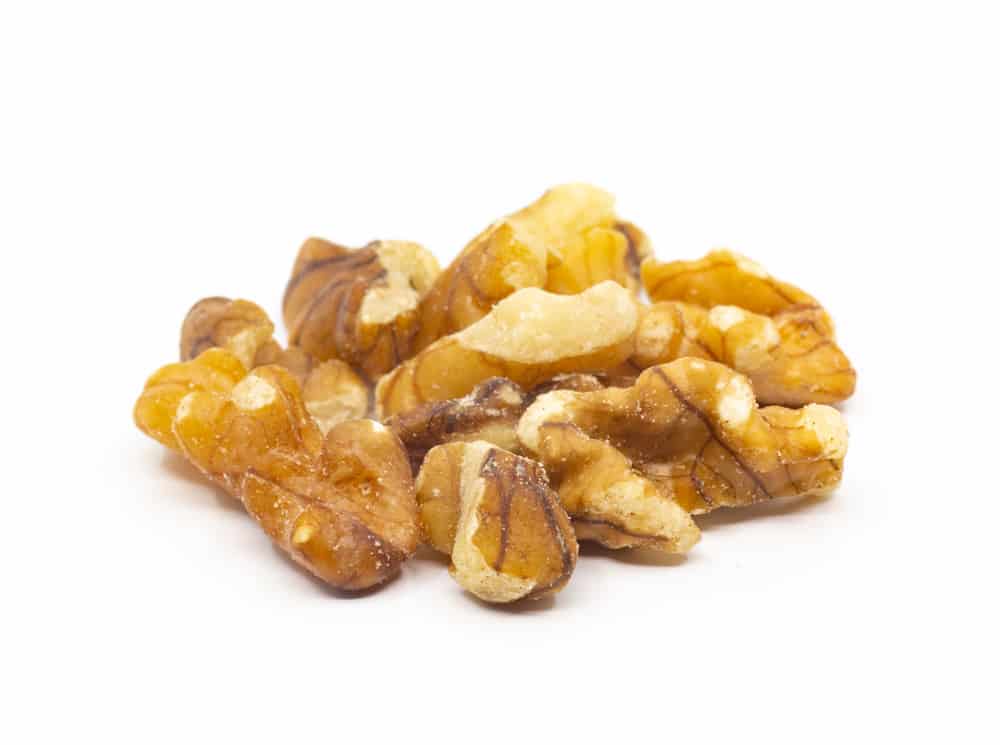The earliest walnuts can be traced back to ancient Europe. In fact, excavations in southwest France have found petrified walnut shells that are more than 8,000 years old. By the 16th and 17th centuries, walnuts were considered medicinal food. Because walnuts resembled human brains, they were believed to quell emotions and boost intelligence.
Today, the United States is one of the leading commercial producers of walnuts. Other producers include Turkey, China, Iran, France, and Romania. One of the single largest walnut farms is found in Kyrgyzstan. You can learn more about this modern walnut farm here.
Walnuts are an excellent source of omega-3 fatty acids. In addition, they are an excellent source of manganese and a good source of tryptophan. But, the nutritional benefits of walnuts have researchers studying the effect on their patients over time.
Walnuts And Cardiovascular Health

In a 2006 study in the Journal of the American College of Cardiology, 12 healthy people and 12 people with high levels of cholesterol found assignment in random groups. One group ate a high-fat meal (80 g of fat, 35 percent saturated fat) that included 40 grams of walnuts or 30 grams of olive oil. At the end of a week, the subjects repeated the study. This time, the subjects who ate walnuts consumed olive oil, and the ones who consumed olive oil ate walnuts.
The researchers studied people with high cholesterol levels after eating a meal with walnuts. The result was an increase in blood flow in the brachial arteries of their arms. An increase of 24 percent. However, after they ate the meal with olive oil, there was a 36 percent decrease in blood flow. What does this mean? Apparently, walnuts were able to neutralize some of the detrimental aspects of a high fat diet. This was not the case with olive oil. Still, the walnut and olive oil meals resulted in decreases in levels of cholesterol and triglycerides. To sum up, olive oil should be considered a food that supports cardiovascular health.
Walnuts And Hypertension
In a study published in 2007 in Hypertension, researchers calculated the amount of omega-3 polyunsaturated fatty acids (PFAs) in the diet of 4,680 men and women. The subjects, between 40 and 59, live in Japan, China, the United Kingdom, and the United States. The four countries in the study will discover that people in Japan consume the highest amounts of omega-3 PFAs. Which is very high in walnuts. Consumers of the most omega-3 PFAs had lower levels of systolic and diastolic blood pressure. The researchers concluded that “food omega-3 PFA intake related inversely to blood pressure. Hence in non-hypertensive persons, with a small estimated effect size. Food omega-3 PFA may contribute to prevention and control of adverse blood pressure levels.”

In a study published in 2009 in The American Journal of Clinical Nutrition, Loma Linda University researchers compared the cholesterol-lowering abilities of walnuts and fatty fish. There was a randomized crossover feeding trial for twenty-five subjects with normal to mild hyperlipidemia or elevated cholesterol levels. In particular, they consumed one of three diets for four weeks:
- A control diet containing no nuts or fish.
- A diet including about 42.5 g of walnuts/day (about a handful).
- A diet in which subjects consumed 113 g of salmon twice per week.
The researchers found that the walnut diet lowered total cholesterol levels by more than five percent and LDL (“bad”) cholesterol levels by more than nine percent. In addition to these findings, the researchers determined that the fatty fish diet decreased triglyceride levels by 11.4 percent and HDL (“good”) cholesterol by 4 percent.
Still, the researchers noted that it is a good idea to include walnuts and fatty fish in the diet. Both foods support cardiovascular health. In a previous blog post, we looked at the cardiovascular benefits of walnuts and blueberries together.
Collecting The Data
Two months later, in another study published in The American Journal of Clinical Nutrition, Harvard researchers analyzed 13 studies on the association between the consumption of walnuts and cardiovascular health. In total, there were 365 participants, and the diets lasted between 4 and 24 weeks. Walnuts provide between 10 and 24 percent of total calories. Evidently, the researchers found “high-walnut-enriched diets significantly decreased total and LDL cholesterol for the duration of the short-term trials”. Furthermore, the researchers acknowledge that “Larger and longer-term trials are what we need to address the effects of walnut consumption on cardiovascular risk and body weight.”
Because people with diabetes are at increased risk for cardiovascular problems, researchers in Australia investigated whether walnuts could be a valuable addition to their diets. In a 2004 study in Diabetes Care, 58 men and women with type 2 diabetes made up multiple groups to study. They had an average age of 59 years. They ate one of three diets in which 30 percent of calories were obtained from fat. A low-fat diet, a modified low-fat diet, and a modified low fat diet. Each diet includes the daily consumption of one ounce of walnuts.
Certainly, at the end of six months, the subjects eating the diet containing walnuts had a significantly higher increase in their HDL-to-total cholesterol ratio than the other groups. After, the walnut eaters also had a 10 percent reduction in their LDL cholesterol levels. Therefore, simply by including a small number of walnuts
in their daily diets, these subjects saw improvements in their cardiovascular health.
Breast Cancer Treatment And Prevention

In a study published in 2008 in Nutrition And Cancer, researchers at the Marshall University School of Medicine in West Virginia divided 22 mice with human breast cancer tumors into two groups. The diet of one group would supplement simple items with walnuts. Evidently, the human equivalent of about two ounces a day. The diet of the other group was fed the control diet. After 35 days, the breast tumors in the walnut-supplemented group were only about half the size of the mice in the control group. In a 2009 article in Women’s Health Weekly, Elaine Hardman, Ph.D., the co-researcher of the study, was quoted. She said, “It is clear that walnuts contribute to a healthy diet that can reduce breast cancer.”
Walnuts For Weight Control

A randomized crossover trial published in 2005 in the British Journal Of Nutrition researched patients over six months. The researchers placed 90 men and women, between the ages of 30 and 72, on two six-month diets. During one six-month period, the participants ate 1 to 1.5 ounces of walnuts daily. The other six-month period served as the control. Evidently, the researchers found that during the six-month walnut phase,’ the average weight gain was less than a pound. They believe this is an insignificant amount. The researchers noted that the regular consumption of walnuts resulted in weight gain. In the final analysis, “This weight gain was much lower than expected. The different diets became non-significant after controlling for differences in energy intake.”
The Nutritional Benefits Of Walnuts In Memory
In a study published in 2009 in the British Journal of Nutrition, researchers at the USDA-ARS Human Nutrition Research Center on Aging at Tufts University in Boston. They randomly assigned aging and weight-matched rats to one of four diet groups. For eight weeks, two groups of rats would be fed two diets. Rats were fed food that contain either two percent, six percent, or nine percent walnuts or a walnut-free diet. After the feeding, they had several motor and memory tests.
The rats that ate the two and six-percent diets experienced improvements in age-related motor and cognitive difficulties. On the other hand, the nine percent diet is associated with memory problems. The researchers “prove for the first time that the nutritional benefits of walnuts in supplementation can improve cognitive and motor performance for aged rats.”
Should the nutritional benefits of walnuts find included in your diet? In conclusion, it would seem that a moderate intake of walnuts is beneficial.



